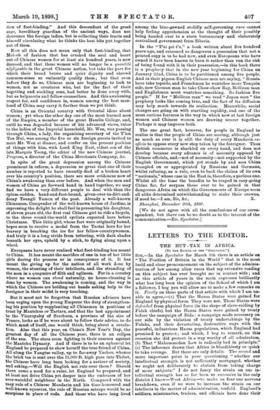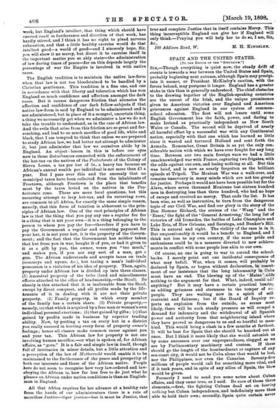LETTERS TO THE EDITOR.
THE HUT - TAX IN AFRICA.
Pre THE EDITOR OF THE 'SPECTATOR.]
Sin,—In the Spectator for March 5th there is an article on "The Position of Britain in the World" that is the most lucid and clear pronouncement on the subject of the adminis- tration of law among alien races that my extensive reading on this subject has ever brought me in contact with ; and as this article of yours in the main expresses brilliantly what has long been the opinion of the School of which I am a follower, I beg you will allow me to make a few remarks on it. Firstly on those parts of that article with which I am un- able to agree,—(a) That the Hausa States were gained for England by physical force. They were not. Those States were defended from physical force (in the shape of slave-raiding by Fulah chiefs), bat the Hausa States were gained by treaty before the campaign of Bida : a campaign made necessary on our side by the violation of treaty undertakings by the Fulahs, and their devastating, destructive ways with the peaceful, industrious Hausa populations, which England had promised to protect ; and which, I beg to remark, on this occasion she did protect in a way worthy of all admiration.
(b) That " Mahommedan Law is radically bad in principle." (c) The inference drawn that Africa is bloodthirsty or quick to take revenge. But these are only details. The second and more important point is your questioning "whether our intellectual strength is not sufficiently mortgaged, whether we ought not deliberately to abstain from taking charge of more subjects." I do not fancy the strain on our in- tellectual strength has so far been so excessive in the only district I know—West Africa—to make us fear our nervous breakdown, even if we were to increase the strain on our intellects in the matter of administration, tenfold. England's soldiers, missionaries, traders, and officials have done their work, but England's intellect, that thing which should have exerted itself in furtherance and direction of that work, has hardly stirred, and I think it has no right to plead nervous exhaustion, and that a little healthy exercise would do that intellect good—a world of good—and I sincerely hope, Sir, you will show it no mercy, but direct it to exercise itself in the important matter you so ably state—the administration of law during times of peace—for on this depends largely the percentage of war the Empire is involved in with native races.
The English tradition is to maintain the native law-form when that law is not too bloodstained to be handled by a Christian gentleman. This tradition is a fine one, and one in accordance with that liberty and toleration which has won England so much confidence and affection amongst the dark races. But it causes dangerous friction that alienates the affection and confidence of our dark fellow-subjects if that native law-form is said by England to be administered and is not administered, but in place of it a mongrel, uncertain thing, a thing we necessarily get when we administer a law we do not take the trouble to understand, as in the case of African law.
And the evils that arise from this friction are so great and far- reaching, and lead to so much sacrifice of good life, white and black, that I am tempted to think that unless we are prepared to study African law, we had better not attempt to administer it, but just administer that law we ourselves abide by in England. An object - lesson in this is before our eyes now in those disturbances connected with the enforcement of the hut-tax on the natives of the Protectorate of the Colony of Sierra Leone, a tax per hut of 5s., a heavy tax because an African's annual wealth per individual is not more than El a year. But I pass over this and the anomaly that no municipal taxes have been collected from the inhabitants of Freetown, although Freetown is the place that benefits most by the taxes levied on the natives in the Pro- tectorate zone. These are mere local questions, but this recurring attempt to levy hut-tax, and its recurring rows, are common to all Africa, for exactly the same simple reason, namely, that this form of taxation is abhorrent to the prin- ciples of African law. One of the root principles of African law is that the thing that you pay any one a regular fee for is a thing that is not your own—it is a thing belonging to the person to whom you pay the fee—therefore if you have to pay the Government a regular and recurring payment for your hut, it is not your hut, it is the property of the Govern- ment; and the fact that the Government has neither taken that hut from you in war, bought it of you, or had it given to it as a gift by you, the owner, vexes you "too much," and makes you, if you are any sort of a man, get a gun. The African understands and accepts taxes on trade (commeys and nyeno, &c.), but taxing a man's individual possession is a violation of his idea of property. Then, again, property under African law is divided up into three classes. (1) Ancestral property of the tribe (land and miscellaneous effects attached to the office of headma.nship,—the Stool). So closely is this attached that it is inalienable from the Stool, except by direct conquest, and all profits made by the life- tenants of it in dealing with it are not their private property. (2) Family property, in which every member of the family has a certain share. (3) Private property,— namely, (a) that which is acquired by a free man or woman's own individual personal exertions ; (b) that gained by gifts ; (c) that gained by profits made in business by superior trading ability. Now, by putting a tax on every hut in a district you really succeed in hurting every form of property owner's feelings ; hence all classes make common cause against you and your tax. This African law for property is not one involving human sacrifice,—or what is spoken of, for African affairs, as "gore." It is a fair and simple law in itself, though full of intricacies in minor details, but a little attention and a perception of the law of Mutten-echt would enable it to be maintained to the furtherance of the peace and prosperity of both our interests and those of the African native. People -here do not seem to recognise how very law-ordered and law- obeying the African is, how far less free to do just what he pleases an African under native conditions is than an English- man in England.
All that Africa requires for her advance at a healthy rate from the hands of our administrators there is a rule of merciless Justice—tiger justice—but it must be Justice, that true and complete Justice that in itself contains Mercy. This thing incorruptible England can give her if England will only think.—Praying you will help her to do so, I am, Sir, !cc.,







































 Previous page
Previous page